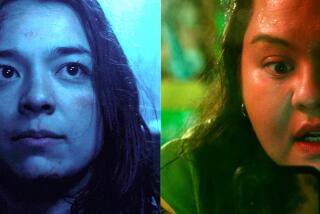Even more Hitchcock
At THIS point there is probably no major filmmaker better represented on DVD than Alfred Hitchcock. Universal’s 14-film Masterpiece Collection, which includes the crown jewels “Vertigo,” “Psycho,” “The Birds” and “Rear Window,” remains the best value for the money, though Warner’s nine-film Signature Collection is perhaps the gold standard, with top-notch transfers of such essential titles as “Strangers on a Train,” “The Wrong Man” and “North by Northwest.” Lionsgate’s Collector’s Edition compiles five of his early British titles, providing a glimpse of Hitchcockian themes and motifs in embryonic form.
Now from MGM comes the eight-disc Premiere Collection, a bit of a mixed bag that brings together three of his British films -- “The Lodger,” “Sabotage,” “Young and Innocent” -- and five from his first decade in the States, including his first Hollywood film, “Rebecca,” and perhaps his best film of the 1940s, “Notorious.” (Most of these movies have been unavailable on DVD for several years.)
Hitchcock’s American films are among the most exhaustively analyzed in Hollywood history, and for many viewers the revelations will be in the earliest titles. The British period, which is invariably overshadowed by two films, “The 39 Steps” and “The Lady Vanishes,” dates to the silent era. In 1927’s “The Lodger,” Hitchcock’s third feature and best-known silent, a triangle of sexual jealousy and suspicion forms against the backdrop of a foggy London terrorized by a Jack the Ripper-like killer. Heavily indebted to the visual flourishes of German Expressionism (Hitchcock directed his first two films in Germany), it also establishes the theme of the falsely accused innocent that would recur many more times in his career.
“Young and Innocent” (1937), one of Hitchcock’s breeziest wrong-man films, is practically a romantic comedy, about the growing attraction between a screenwriter framed for murder and the chief constable’s daughter, who helps him escape. “Sabotage” (1936), perhaps the darkest and cruelest of his early work, is a loose adaptation of Joseph Conrad’s novel “The Secret Agent” -- though not to be confused with the other Hitchcock movie from 1936, called “Secret Agent,” or with his 1942 film, “Saboteur.” Unbeknownst to his young wife (Sylvia Sydney), a cinema owner (a superb Oscar Homolka) belongs to a shadowy cabal of anarchists. The violent centerpiece is the explosion of a double-decker bus, brought about by a time bomb hidden in a can of film.
Hitchcock’s Hollywood career began on a high note with his lush and haunting Daphne Du Maurier adaptation, “Rebecca” (1940), which launched Joan Fontaine’s career and was the only Hitchcock film to win the best-picture Oscar. “Lifeboat” (1944) takes place entirely on a tiny boat, amid the disparate survivors of a bombed ocean liner -- and the German U-boat captain responsible for sinking the ship. Feeble as drama, it nonetheless prefigures more successful conceptual experiments such as the real-time “Rope” and the single-set “Rear Window.”
“Spellbound” (1945), an amnesiac love story-cum-whodunit with Gregory Peck and Ingrid Bergman, borrows from two fashionable movements of the day: Freudian psychoanalysis and surrealism (Salvador Dali contributed the famous dream sequence). Hitchcock gave Bergman one of her greatest roles (and Cary Grant one of his) in the following year’s masterful “Notorious” (1946), an endlessly perverse and ambiguous romance in the guise of an espionage thriller. Rounding out the set is the courtroom drama “The Paradine Case” (1947), with Peck as a defense lawyer who falls for his client (Alida Valli).
Of the titles in the MGM set, “Rebecca,” “Spellbound” and “Notorious” also are being released individually. In all, it’s been a good, if costly, month for Hitchcock fans. Universal has just issued two-disc special editions of perhaps the three most iconic Hitchcock titles -- “Vertigo,” “Psycho” and “Rear Window” -- featuring improved digital transfers and a bounty of new supplements.
More to Read
Only good movies
Get the Indie Focus newsletter, Mark Olsen's weekly guide to the world of cinema.
You may occasionally receive promotional content from the Los Angeles Times.









